Menu
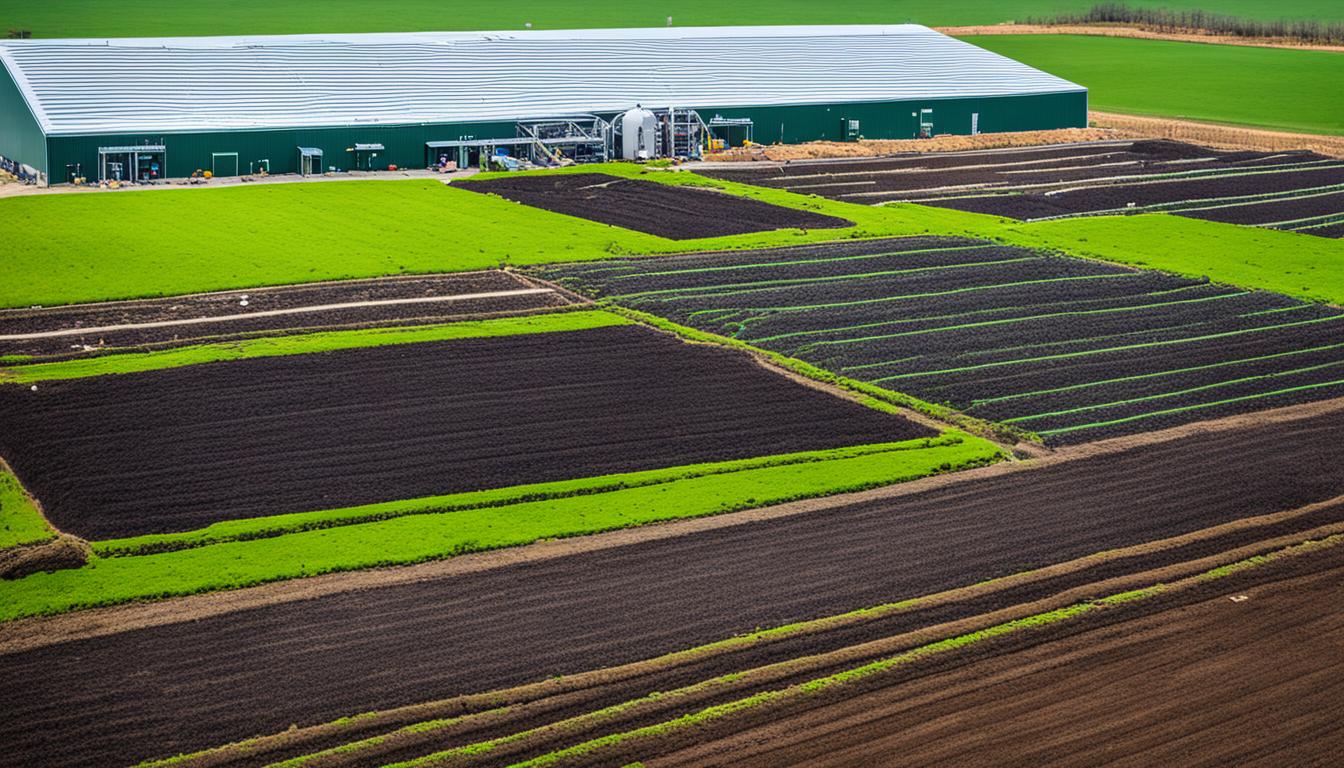
Did you know the agricultural sector worldwide creates 1.6 billion tons of waste each year? This huge amount highlights a big issue in modern farming. How to handle and get rid of the waste, especially with more people and more farming happening.
Farm waste comes in many forms, from bones and feathers to wastewater and pesticides. If not managed well, this waste can cause a lot of pollution. It affects the quality of our soil, water, and air. By following rules on how to deal with this waste, we protect the environment and keep our natural areas safe.
Agricultural waste management is key to lessen environmental harm and promote sustainable practices. It’s crucial because farming is vital for food and resources. Good waste management keeps our ecosystems safe and public health in check.
Farming produces a lot of waste like crop leftovers, animal manure, and chemical containers. Without good handling, this waste can pollute soil, water, and air. But, with proper waste management, farms can follow rules, protect the environment, and keep people healthy.
Modern farming’s waste is hard to deal with. Much of this waste comes from plastic and harmful chemicals. To address these issues, new solutions like anaerobic digestion and biogas are becoming popular. These approaches get support in Asia, South America, and Africa.
Methane and nitrous oxide are gases emitted when wastes decompose. Handling these emissions well is crucial. It’s about following regulations for sustainable actions. Technology, like remote sensing, also helps many farms use their resources better.
Agricultural waste includes many materials from farming. It is crucial to know and separate this waste. This helps follow agricultural waste disposal regulations. It also supports agricultural sustainability laws. Here are the main types of agricultural waste:
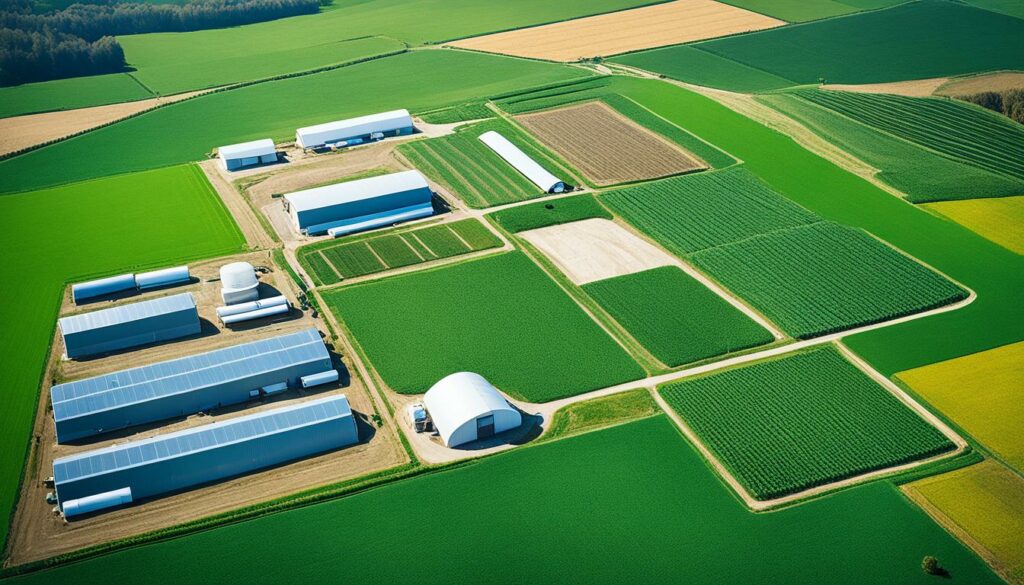
Common solid waste includes crop leftovers, animal dung, and unused pesticides. These materials, if not handled properly, harm the environment. They can cause soil and water pollution. To tackle this issue, many places have started making biogas. This is done with small machines. They are common in Asia, South America, and Africa. Also, turning plant leftovers and dung into compost helps. This compost is good for farming, which makes agriculture more sustainable.
Liquid waste comes from dairy farms, dirty water, and manure-filled runoff. It is important to manage this waste correctly. If not, it can pollute the water. To solve this problem, there are methods like using natural processes. These include anaerobic digestion. This method turns waste into biogas. It is used for energy. The leftover digestate can be used to fertilise crops. So, these methods make a closed loop in farming.
Waste from chemicals and factories in farming includes pesticides and herbicides. These can be dangerous if not handled well. There is a better way, which is integrated pest management. This method uses less chemical. It relies on natural ways to manage pests, such as changing the crops grown or introducing other animals to control pests. Technology also helps. Remote sensing and waste-to-energy technologies make managing this waste better. They help meet safety rules and protect the environment.
Around 135,500 tonnes of agricultural plastic waste is produced each year in the UK, with approximately 32,000 tonnes from plastic packaging waste and approximately 103,500 tonnes from non-packaging plastics.
Moving forward, it’s key to keep improving how we deal with waste. We should know the different types of agricultural waste. Using the right ways to dispose and recycle can lessen the harm to our surroundings. It also helps farming stay sustainable.
Farm waste has a big impact on the environment. It’s important to have strict farm waste management guidelines. Following waste management regulations farming is key. This helps reduce pollutants affecting the soil, water, and air we depend on.
Uncontrolled farm waste puts heavy metals and organic pollutants into the soil. This messes up soil health and makes it hard for plants and animals to live. Such waste also throws off the natural balance of the soil. This can make farm food less safe to eat.
Manure and fertilisers add too many nutrients to water. This makes eutrophication happen, lowering oxygen and harming life in water. Without sticking to farm waste management guidelines and waste management regulations farming, water doesn’t stay clean. Important steps are needed to keep our water ecosystems safe.
Farm waste, when burned or rotted, lets out lots of methane and other gases. These gases harm the air and climate. Farm food waste alone creates 2.2 gigatonnes of CO2eq from methane each year. Good waste management helps reduce these bad effects. This means better air for all of us.
Farm waste really affects our environment. And that’s why we must take farm waste management seriously. By sticking to farm waste management guidelines and waste management regulations farming, we can keep our earth healthier. This leads to better farming for the future.
Handling agricultural waste in the USA is vital for environmental compliance farming. The EPA set up laws to make sure waste is managed well. This protects our environment.
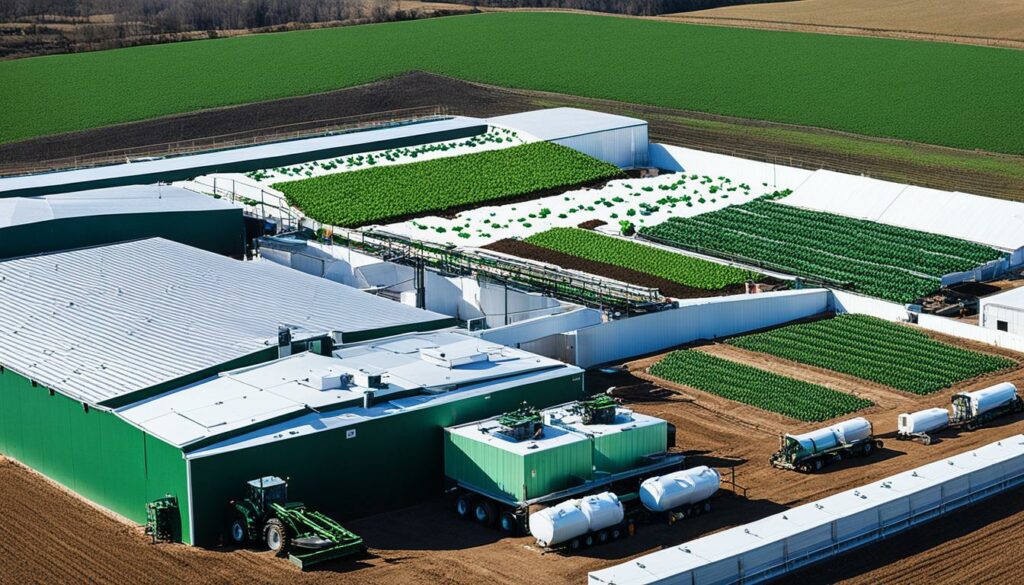
The Clean Water Act (CWA) focuses on how we manage water waste, including in farming. Farms must treat water waste to stop harmful stuff from getting into our water. Part 208 of this law helps plan how to manage solid waste with an eye on water quality.
Guided by the Clean Air Act (CAA), farms must follow rules to cut down on air pollution. This includes managing manure and how they burn waste. Working with state rules under the CAA keeps our air clean for everyone.
The Resource Conservation and Recovery Act (RCRA) is about handling solid and dangerous wastes, often from farms. This law stresses using safe ways to store, treat, and get rid of waste. Tools like the Agricultural Waste Management (AWM) help in following RCRA and other agricultural waste legislation.
Below is a table that lists the main goals of these laws:
| Legislation | Key Focus | Application in Agriculture |
|---|---|---|
| Clean Water Act (CWA) | Wastewater Standards | Prevents water pollution from farm operations |
| Clean Air Act (CAA) | Emissions Regulations | Controls air pollutants from agricultural sources |
| Resource Conservation and Recovery Act (RCRA) | Solid and Hazardous Waste Disposal | Ensures safe disposal of agricultural waste |
These rules are key to keeping farms environmentally compliant and keeping our nature safe. Farmers must follow these laws to do their part in protecting our health and environment.
Today, we know that farming needs to meet important rules. The food we grow makes up 26% of all greenhouse gases. So, following the agricultural waste guidelines is key to lessening these gases and protecting our planet.
Farmers must abide by laws like the Clean Water Act and the Clean Air Act. These laws are in place to keep our water and air clean. They also make sure dangerous materials like old pesticide containers are handled safely.
Dealing with waste on farms is vital for the environment and for obeying the law.
Farms need good waste plans. These plans should focus on making less waste and reusing what they can. For example, turning animal waste into compost helps the soil and cuts the need for chemical fertilisers.
There are key steps to managing waste well:
It’s also important to set goals, like using less food or recycling more. These aims keep farms working to be better at handling waste, following the agricultural waste guidelines, and improving regularly.
Using new waste management solutions is key for farms to be sustainable. They can manage waste well and also create useful resources.
Anaerobic digestion systems are great for handling farm waste. They turn organic waste into biogas. This reduces harmful emissions and creates a renewable energy source. The EU is making rules to boost the use of biogas.
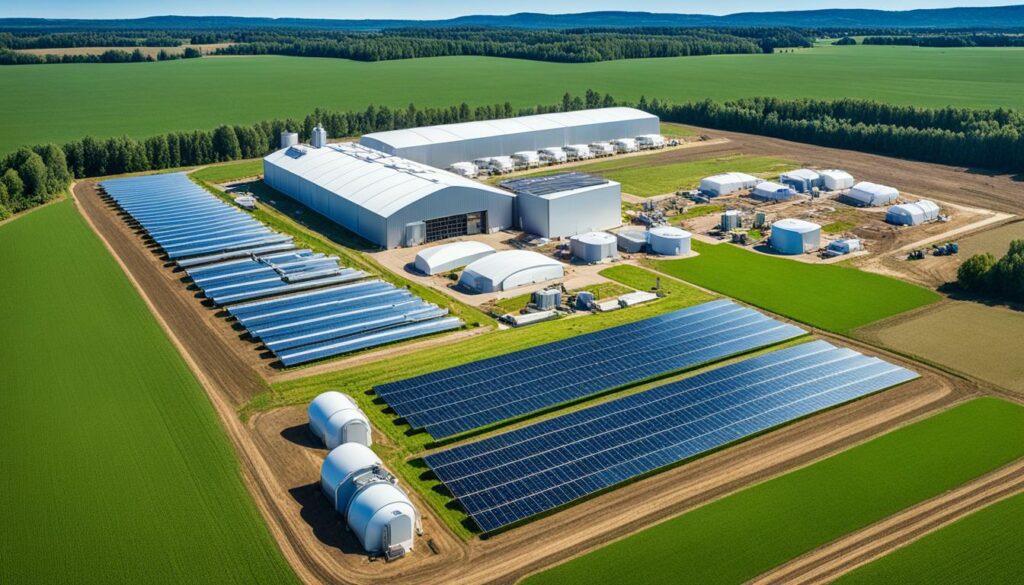
Composting is a top method for dealing with waste on farms. It turns farm waste like crop leftovers and animal waste into compost. This compost is great for the soil, making it richer and better for growth. It also helps save water, stop weeds, and keep nutrients in the soil. Good composting follows rules and helps fight climate change by cutting down on harmful gases.
High-tech recycling turns farm leftovers into useful things like green energy and chemicals. This method improves the soil’s health by adding nutrients and organic material. It also helps the soil hold water better. These ways not only meet environmental rules but also help to use resources better. They cut down on using oil and make less waste.
Adopting sustainable ways in farming is key to less waste and better efficiency. Techniques, such as precision farming and rotating crops, plus cover crops, bring big pay-offs. They’re good for the planet and your wallet.
Precision farming means using tech to wisely use resources. It involves things like remote sensing and GPS. This way, farms apply things like water and fertilisers right to the spot they’re needed. It cuts waste and boosts farm output, keeping in harmony with rules for sustainable farming.
Switching crops and planting cover crops are vital for keeping soil healthy. When farmers change what they grow, it confuses pests and helps the soil hold onto nutrients better. Cover crops, grown outside the main growing season, also stop the soil from washing away.
| Practice | Benefits | Compliance |
|---|---|---|
| Precision Farming | Optimises resource use, enhances productivity | Supports waste management regulations |
| Crop Rotation | Improves soil health, disrupts pest cycles | Adheres to sustainability laws |
| Cover Cropping | Reduces soil erosion, promotes nutrient retention | Complies with environmental regulations |
By combining these methods, farms not only follow waste rules but also boost long-term health. They help save money and the environment, fitting into a bigger green strategy. It’s a win-win for everyone involved.
Technology is key in making farming waste management better. It uses things like remote sensing and data analytics. These help farms deal with waste better, meeting the farm waste rules.
Using remote sensing and data analytics changes how farms handle waste. GPS and satellites give farmers up-to-the-moment info. This info helps them use things like water and fertilisers better, cutting down on waste.
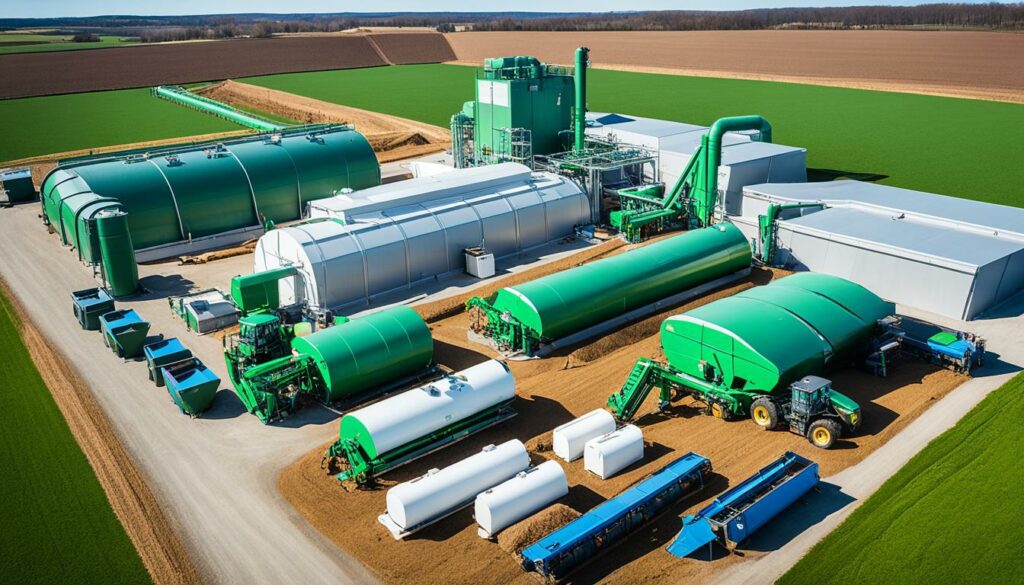
Biotech is changing how we see farm waste, turning it into useful stuff. Things like fermentation make biogas, chemicals, and fertilisers. This helps the environment and follows disposal rules.
Proper waste management is vital for farms. It’s not just for the planet but also brings economic perks. When farmers handle waste well, they cut costs and find new ways to make money.
Farmers save a lot by following waste guidelines. They avoid fines and costly legal troubles. Also, using waste for things like making compost is a win-win. It’s good for the earth and means less money spent on expensive fertilisers.
Waste turned into mulch helps keep soil moist. This cuts down on watering expenses. Plus, reducing water use is good for the environment.
Good waste management can bring in more income for farmers. Anaerobic digestion turns waste into energy. This energy can be used on the farm or sold. Making and selling compost can also boost earnings.
| Economic Benefits | Impact |
|---|---|
| Cost Savings | Reduced costs on fertilisers, law compliance, and less water spent |
| Additional Revenue Streams | Profit from biogas, compost sales, and energy |
Since the 1970s, many places like Asia, Africa, and South America have adopted biogas digesters. These devices help turn waste into energy. The EU, too, is pushing for big advances in green agriculture. They want biogas to be a major part of farm waste solutions.
Exploring examples of good waste management shows us how farms can handle waste well. In this part, we look at two top farms. One is great at making compost, and the other is a champ at producing biogas.
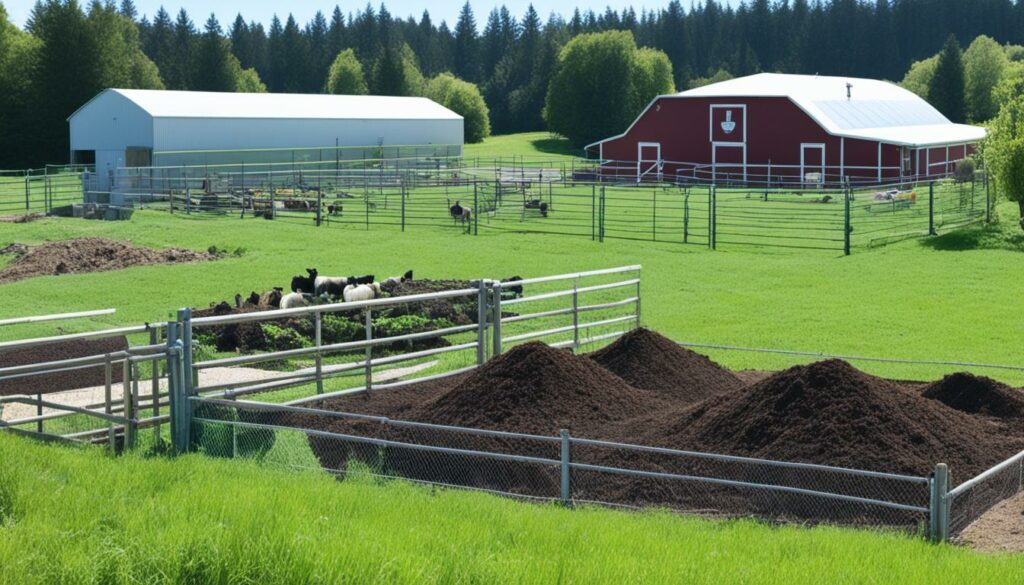
Farm A has a cutting-edge way of composting. They follow strict rules for managing farm waste. They gather organic waste carefully, turning it into compost rich in nutrients. This way, they cut down a lot on waste that would normally end up in the trash.
This farm’s advanced composting is good for the Earth too. It helps reduce the release of methane, a harmful gas. This gas is often made when organic waste rots in landfills. So, by doing this, Farm A helps keep the air clean. They meet the farm waste management guidelines perfectly, showing how farms can be green and still do well.
Farm B is all about making biogas. They turn animal poop and other organic waste into an energy source. This does good for the farm and the planet. It meets the farming industry waste regulations and lowers waste amounts.
Another thumbs-up from Farm B’s biogas work is creating energy and fertiliser. The leftover from making biogas is a super soil booster. It means they use fewer chemicals on their fields. This proves that following farm waste management guidelines makes farming more eco-friendly.
From these examples, we see how smart waste management boosts the environment and helps farms. It’s a win for everyone.
| Case Study | Practices Implemented | Outcomes |
|---|---|---|
| Farm A | Advanced Composting | Reduction in landfill waste, improved air quality, nutrient-rich compost production |
| Farm B | Biogas Production | Renewable energy generation, reduced chemical fertiliser use, enhanced soil fertility |
Managing agricultural waste well is key to keeping our environment healthy. To do this, it’s important to follow rules at both local and global levels. These rules help ensure that waste isn’t harming our planet.
The FAO and the Paris Accord offer important guidelines on how to manage waste sustainably. They encourage reducing waste to lower the big part agriculture plays in greenhouse gas emissions. By following these international rules, farmers can meet environmental compliance farming standards.
Every country has its own rules to tackle local environmental issues. The US has the Clean Water Act and Clean Air Act, critical for environmental protection. Even small farms must obey. This protects against pollution and encourages being eco-friendly.
Using techniques like anaerobic digestion to recycle organic waste is very crucial. It helps the soil, and it also produces renewable energy. These methods support the goals of agricultural waste legislation.
| International Guidelines | Country-Specific Regulations |
|---|---|
|
|
Dealing with hazardous waste on farms requires following strict rules. It’s crucial to store and get rid of waste right. Farmers must work hard to prevent pollution and stick to laws that protect the environment.
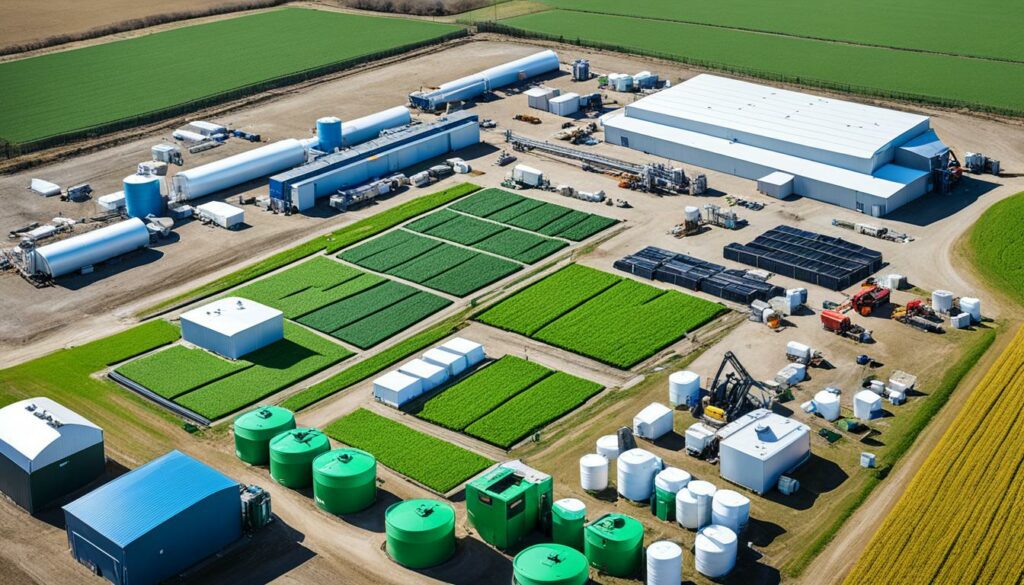
Storing waste safely stops leaks and keeps areas from getting dirty. Hazards should be in tough, clearly marked containers. These containers stay in an area that’s not near water or food. This lowers the chance of hurting the environment.
Farmers also need to keep a list of the waste they have. This makes it easy to follow rules and be ready for inspections. It ensures that they meet all the legal rules.
Getting rid of dangerous waste can be done in safe ways. Specialist landfills keep bad stuff away from water and soil. Burning waste in a special way can also make it safe. This method gets rid of harmful chemicals without hurting people or nature.
The Resource Conservation and Recovery Act makes sure these ways are used correctly. It keeps everyone safe and protects our planet.
| Act | Regulations |
|---|---|
| Clean Air Act (CAA) | Limits on air pollutants from larger agricultural operations. |
| Clean Water Act (CWA) | Establishes wastewater standards to prevent water contamination. |
| Resource Conservation and Recovery Act (RCRA) | Governs the disposal of solid and hazardous wastes. |
| CERCLA (Superfund) | Involved in cleaning sites contaminated with hazardous substances. |
| FIFRA | Oversees the sale, distribution, and use of pesticides. |
Sustainable waste management in farming is a key issue for both government and non-governmental groups. They have worked hard over the past fifty years to improve how waste is dealt with in agriculture. They have introduced many projects and support to make this happen.
World governments have passed laws and given benefits to help farms deal with waste better. The European Union (EU) has improved its laws to help make biogas more. This type of energy doesn’t just get rid of waste but also helps power places in the countryside.
In places like Asia, South America, and Africa, local governments have focused on small biogas plants. These can turn animal waste and other matter into useful biogas and rich soil. Put simply, these plants help produce power and keep the environment clean.
Over the past five decades, governments and non-governmental institutions have supported the implementation of small-scale biogas digesters in rural areas, primarily in Asia, South America, and Africa.
Groups not linked to governments have done a lot too in promoting better waste management in farms. They have educated farmers and started many projects to turn waste into energy and good soil. Their work covers a wide range of waste issues in farming.
The Food and Agriculture Organization of the United Nations (FAO) is one of these groups. They highlight the value in using farm waste to make useful things like biofuels and vitamins. Non-governmental organisations have also used new technologies to help farmers use less and waste less. This makes farming more efficient and better for the planet.
| Supporting Entity | Key Initiative | Regions Benefited |
|---|---|---|
| European Union | Legislation for Biogas Generation | Europe |
| FAO | Promotion of Agro-Industrial Waste Utilisation | Global |
| Various NGOs | Biomass Conversion and Technological Advancements | Asia, South America, Africa |
New tech and coming rules are big for handling farm waste. Soon, how we deal with waste will change a lot. This change is good for the earth and for farming’s future.
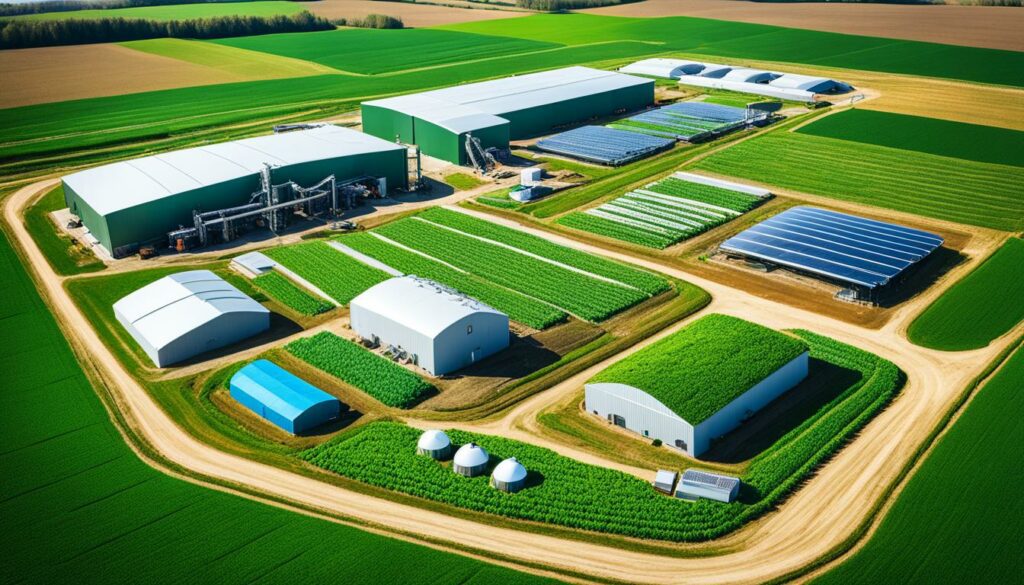
New technologies are going to change how farms deal with trash. Anaerobic digestion and precision farming are leading the charge.
Soon, the rules will be tougher and there will be rewards for better waste handling. These changes will push farms to be more careful with waste and help the planet.
Thanks to tech and new rules, waste from farms will be handled well and in ways that help our planet. By following these farming industry waste regulations and using new tech, farms can make a big difference. They can reduce how much they harm our planet and create a better future.
Strict rules on dealing with waste in farming are really important. The farming industry worldwide causes a massive 1.6 billion tons of waste each year. A huge part of this, 1.2 billion tons, is food that goes to waste. This waste makes up 15.3% of all the food produced globally. In the US, 103 million tons of food ends up in landfills yearly. This is over a quarter of all the trash collected, showing why we need tough rules to protect our planet.
Handling waste well, both organic and not, can help save our environment. Waste from farms alone causes 2.2 gigatonnes of CO2 emissions yearly. These gas emissions make climate change worse. Also, waste can pollute our water and air. There are laws like the Clean Water Act to help. But, it’s up to everyone to follow and make sure these laws are working.
For farming to be sustainable, new waste handling methods are key. Using tech and smart techniques can cut down on waste and make farming more efficient. Things like smart farming, changing where crops grow, and better ways to compost are a good start. Also, laws and guidelines alone aren’t enough. Farmers, leaders, and communities need to work together. This teamwork is vital for making sure farming is kind to the planet. With the right focus on waste and following the rules, we can have agriculture that’s better for our earth.
Waste management is key in farming to reduce harm to the environment. It helps farms stay sustainable and keeps natural systems and people healthy. By managing waste well, we avoid pollution and support the health of farming areas.
Large amounts of different wastes, like solid, liquid, and chemical types, pose challenges. If not handled properly, these can pollute the soil, water, and air, risking the health of our environment and safety.
Farming creates various waste, including crop leftovers and animal waste. It also produces fluids from milking and water pollution, plus chemical waste from farming aids.
Farm waste can harm the soil, water, and air. Heavy metals and toxins in the soil and water can be poisonous, leading to less clean air and water for everyone.
The US has laws like the Clean Water Act and the Clean Air Act. It also has the Resource Conservation and Recovery Act for solid and harmful waste. These laws help protect our environment, stop pollution, and make sure farms manage waste properly.
Knowing the rules, making solid waste management plans, and trying to avoid creating waste are all good practices. Farming can cut waste, reuse more, and find better ways to get rid of waste, like with composting and reusing energy from waste.
New tech, like sensors and maps, can help farms use less and waste less. It also allows farms to turn waste into energy and products that are good for the environment.
Managing waste well can save money and make farms more profitable. It can also lead to new ways to sell waste as useful products, making farming more self-sustaining.
Global and local rules push for better farming practices that use less and harm less. They make sure farms manage their waste in ways that support the environment and farming’s future.
Storing dangerous farm waste safely and using designed landfills and burning are safe ways to handle it. These methods follow strict rules to protect the environment and people.
Governments set rules and help farms use less waste, and NGOs teach and start projects that make farming gentler on the planet. This helps farmers and communities live and grow in safer places.
The future is about using new ways to reuse waste and turn it into useful products. Laws will become stronger, making farms find even better waste solutions, which will help the planet and farming grow together.